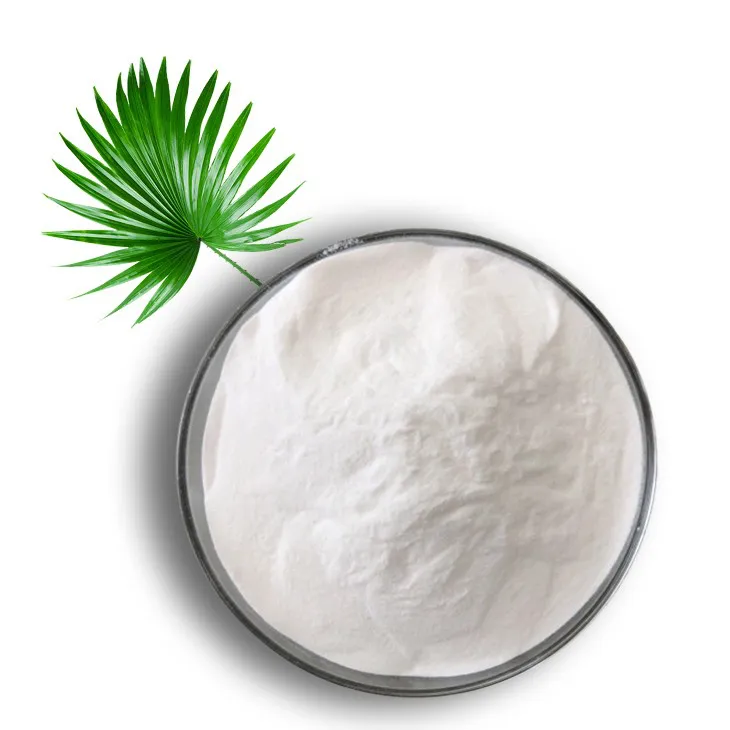- 0086-571-85302990
- sales@greenskybio.com
Saw Palmetto Extract: Benefits and Consumption Guide
2024-11-13

1. Introduction
Saw Palmetto Extract has emerged as a popular supplement in recent years, drawing the attention of both consumers and the scientific community. Native to the southeastern United States, the saw palmetto plant (Serenoa repens) has a long history of traditional use. Today, it is being studied extensively for its potential health benefits.

2. The Composition of Saw Palmetto Extract
The extract is rich in various bioactive compounds. Fatty acids and sterols are among the main components. For example, it contains lauric acid, myristic acid, and oleic acid. These fatty acids are believed to contribute to its potential health - promoting properties. Phytosterols such as beta - sitosterol are also present, which may play a role in interacting with hormones in the body.

3. Benefits of Saw Palmetto Extract
3.1 Prostate Health in Men
One of the most well - known benefits of saw palmetto extract is its potential support for prostate health in men. As men age, the prostate gland may enlarge, a condition known as benign prostatic hyperplasia (BPH). Symptoms of BPH can include frequent urination, difficulty starting and stopping urination, and a weak urine stream.
Studies have suggested that saw palmetto extract may help relieve some of these symptoms. It is thought to work by inhibiting the conversion of testosterone to dihydrotestosterone (DHT). DHT is a hormone that plays a role in the growth of the prostate gland. By reducing DHT levels, saw palmetto extract may potentially slow down the enlargement of the prostate.
3.2 Hormonal Balance
In addition to its effects on the prostate, saw palmetto extract may also contribute to hormonal balance in both men and women. In men, as mentioned above, it can influence testosterone metabolism. In women, it may have an impact on hormonal fluctuations, especially during menopause.
During menopause, women experience a decline in estrogen levels. Saw palmetto extract may help modulate the hormonal environment by interacting with androgen receptors. This interaction could potentially alleviate some menopausal symptoms such as hot flashes and mood swings, although more research is needed in this area.
3.3 Anti - Inflammatory Properties
The extract has also been shown to possess anti - inflammatory properties. Inflammation is a common underlying factor in many chronic diseases. Saw palmetto extract may reduce inflammation through various mechanisms, including modulating the production of inflammatory cytokines.
For example, in vitro studies have demonstrated that it can inhibit the release of certain inflammatory mediators. This anti - inflammatory effect may be beneficial for conditions such as arthritis, where chronic inflammation is a key feature.
3.4 Hair Health
There is some evidence to suggest that saw palmetto extract may be beneficial for hair health. Since it can inhibit the production of DHT, which is associated with hair loss in both men and women, it may help prevent hair thinning and promote hair growth.
However, it should be noted that while there are promising initial results, more clinical trials are required to firmly establish its effectiveness in treating hair loss.

4. Consumption Guide
4.1 Dosage
The appropriate dosage of saw palmetto extract can vary depending on the individual and the intended use. For general prostate health support in men, a typical dosage ranges from 160 - 320 mg per day. However, it is important to consult a healthcare provider before starting any supplement regimen.
If the extract is being used for other purposes, such as hormonal balance or hair health, the dosage may need to be adjusted accordingly. In some cases, a lower dosage may be sufficient, while in others, a higher dose may be required, but this should be determined under medical supervision.
4.2 Forms of Saw Palmetto Extract
Saw palmetto extract is available in various forms, including capsules, tablets, and liquid extracts.
- Capsules are one of the most common forms. They are convenient to take and usually contain a standardized amount of the extract. When choosing capsules, it is important to check the label for the quality and purity of the product.
- Tablets are also available. Similar to capsules, they should be sourced from reliable manufacturers. Tablets may sometimes be combined with other nutrients or herbs for added benefits.
- Liquid extracts offer a different option. They can be more easily absorbed by the body in some cases. However, they may have a stronger taste, which some people may find unpleasant. When using liquid extracts, it is crucial to follow the dosing instructions carefully as the concentration may vary.
4.3 Precautions and Side Effects
While saw palmetto extract is generally considered safe for most people when taken as directed, there are some precautions to be aware of.
- Pregnancy and Breastfeeding: Pregnant and breastfeeding women should avoid taking saw palmetto extract as its effects on fetal development and infants are not well - understood.
- Allergic Reactions: Some individuals may be allergic to saw palmetto. Symptoms of an allergic reaction can include rash, itching, and difficulty breathing. If any allergic symptoms occur, use of the extract should be discontinued immediately and medical attention sought.
- Drug Interactions: Saw palmetto extract may interact with certain medications. For example, it may enhance the effects of blood - thinning medications. Therefore, if you are taking any prescription medications, it is essential to inform your doctor before starting saw palmetto extract.
Side effects are generally mild and may include digestive issues such as nausea, diarrhea, and abdominal discomfort. These side effects usually subside on their own, but if they persist or worsen, medical advice should be sought.
5. Research and Future Directions
While there has been a significant amount of research on saw palmetto extract, there are still many areas that require further investigation.
5.1 Long - term Efficacy and Safety
Most of the current studies on saw palmetto extract have been relatively short - term. Long - term studies are needed to determine its efficacy and safety over extended periods of use. This is particularly important for its use in chronic conditions such as BPH.
5.2 Mechanisms of Action
Although some mechanisms of action have been proposed, such as its effect on DHT levels, there are likely other mechanisms at play. Further research is needed to fully understand how saw palmetto extract exerts its various health benefits.
5.3 Clinical Trials for Specific Conditions
More clinical trials are required for specific conditions, such as its use in treating hair loss or menopausal symptoms. These trials should be well - designed, with appropriate control groups, to accurately assess the effectiveness of the extract.
6. Conclusion
Saw palmetto extract offers a range of potential benefits, from supporting prostate health in men to contributing to hormonal balance. However, it is important to follow proper consumption guidelines to ensure safety and effectiveness. As research in this area continues to evolve, our understanding of the extract's properties and uses will likely become more comprehensive.
FAQ:
1. What is saw palmetto extract?
Saw palmetto extract is derived from the fruit of the saw palmetto plant (Serenoa repens). It contains various bioactive compounds that are believed to contribute to its potential health benefits.
2. How does saw palmetto extract support prostate health?
It may work by inhibiting the conversion of testosterone to dihydrotestosterone (DHT). High levels of DHT are associated with prostate enlargement. By reducing DHT levels, saw palmetto extract might help in maintaining a healthy prostate size and function.
3. Can women also benefit from saw palmetto extract?
Yes, women may benefit as well. It can potentially help with hormonal balance in women. For example, it may be beneficial for some women with polycystic ovary syndrome (PCOS) where hormonal imbalances are a key factor, although more research is needed in this area.
4. What are the proper consumption guidelines for saw palmetto extract?
The dosage can vary depending on the form (capsules, tablets, tinctures etc.) and the intended use. Generally, it is recommended to follow the instructions on the product label. However, it is also advisable to consult a healthcare provider before starting supplementation, especially if you have any pre - existing medical conditions or are taking other medications.
5. Are there any side effects of saw palmetto extract?
Some possible side effects include mild digestive issues such as nausea, stomach discomfort, and diarrhea. In rare cases, it may also cause headache or dizziness. However, these side effects are not common and usually occur at higher dosages or in individuals who are more sensitive to the extract.
Related literature
- The Role of Saw Palmetto in Prostate Health: A Review"
- "Saw Palmetto Extract: Efficacy, Safety and Clinical Applications"
- "Hormonal Modulation by Saw Palmetto: Current Understanding and Future Perspectives"
- ▶ Hesperidin
- ▶ citrus bioflavonoids
- ▶ plant extract
- ▶ lycopene
- ▶ Diosmin
- ▶ Grape seed extract
- ▶ Sea buckthorn Juice Powder
- ▶ Beetroot powder
- ▶ Hops Extract
- ▶ Artichoke Extract
- ▶ Reishi mushroom extract
- ▶ Astaxanthin
- ▶ Green Tea Extract
- ▶ Curcumin Extract
- ▶ Horse Chestnut Extract
- ▶ Other Problems
- ▶ Boswellia Serrata Extract
- ▶ Resveratrol Extract
- ▶ Marigold Extract
- ▶ Grape Leaf Extract
- ▶ blog3
- ▶ blog4
- ▶ blog5
-
Organic Tongkat Ali extract powder factory.
2024-11-13
-
How to make powder with ashwagandha extract.
2024-11-13
-
Rosehip extract manufacturers from China.
2024-11-13
-
The best cat's claw extract in nature.
2024-11-13
-
Chinese Dandelion Leaf Extract Suppliers.
2024-11-13
-
Natural grape seed extract
2024-11-13
-
Cassia Seed Extract
2024-11-13
-
Tormentil Extract
2024-11-13
-
Hops Extract
2024-11-13
-
Artichoke Leaf Extract
2024-11-13
-
Lemon Extract
2024-11-13
-
Aminolevulinic acid
2024-11-13
-
Bitter Melon Extract
2024-11-13
-
Nettle Root Extract
2024-11-13
-
Medicinal Marshmallow Extract
2024-11-13





















